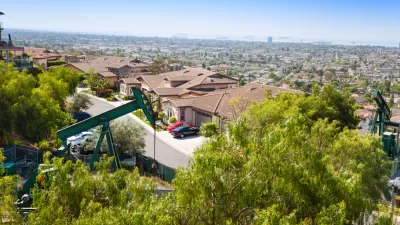A group of Lincoln Heights residents expressed concerns about a proposed warehouse that would have brought increased truck traffic to an already overburdened area.

Residents in the Los Angeles community of Lincoln Heights banded together to stop a proposed warehouse project that would have brought large amounts of traffic through a residential neighborhood.
As Jim Newton explains in CALmatters, the project is “adjacent to a school, and it’s right in the middle of a community that’s already overburdened. The residents of Lincoln Heights carry more than their share of the pollution and inconvenience that modern society extracts in return for commerce.”
City Councilmember Eunisses Hernandez, who represents the area, says the developer
failed to secure the necessary permits. “If they intend to go forward with the warehouse, they will need to hold public hearings and address the neighborhood’s concerns.”
Ultimately, the project could still go forward, but there will be a lot more checks in place to ensure community concerns are heard. “For now, Lincoln Heights gets a reprieve, as well as a mobilized set of residents and a council member committed to looking out for them.”
FULL STORY: Setback for Los Angeles warehouse project made Lincoln Heights a stronger community

Planetizen Federal Action Tracker
A weekly monitor of how Trump’s orders and actions are impacting planners and planning in America.

Map: Where Senate Republicans Want to Sell Your Public Lands
For public land advocates, the Senate Republicans’ proposal to sell millions of acres of public land in the West is “the biggest fight of their careers.”

Restaurant Patios Were a Pandemic Win — Why Were They so Hard to Keep?
Social distancing requirements and changes in travel patterns prompted cities to pilot new uses for street and sidewalk space. Then it got complicated.

Platform Pilsner: Vancouver Transit Agency Releases... a Beer?
TransLink will receive a portion of every sale of the four-pack.

Toronto Weighs Cheaper Transit, Parking Hikes for Major Events
Special event rates would take effect during large festivals, sports games and concerts to ‘discourage driving, manage congestion and free up space for transit.”

Berlin to Consider Car-Free Zone Larger Than Manhattan
The area bound by the 22-mile Ringbahn would still allow 12 uses of a private automobile per year per person, and several other exemptions.
Urban Design for Planners 1: Software Tools
This six-course series explores essential urban design concepts using open source software and equips planners with the tools they need to participate fully in the urban design process.
Planning for Universal Design
Learn the tools for implementing Universal Design in planning regulations.
Heyer Gruel & Associates PA
JM Goldson LLC
Custer County Colorado
City of Camden Redevelopment Agency
City of Astoria
Transportation Research & Education Center (TREC) at Portland State University
Camden Redevelopment Agency
City of Claremont
Municipality of Princeton (NJ)





























